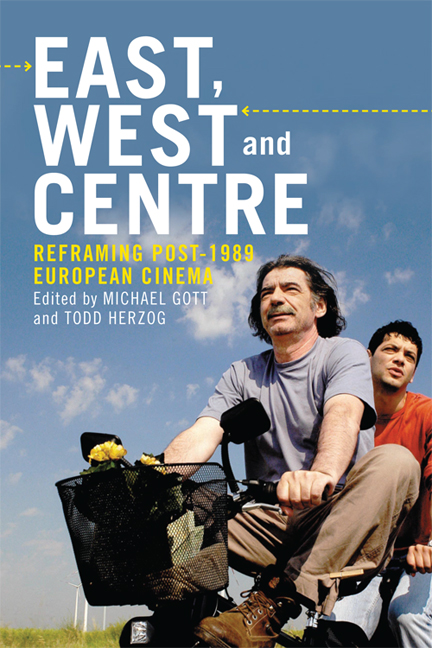Book contents
- Frontmatter
- Contents
- List of Figures
- Notes on Contributors
- Acknowledgements
- Introduction: East, West and Centre: ‘Mapping Post-1989 European Cinema’
- Part I Redrawing the Lines: De/Recentring Europe
- Part II Border Spaces, Eastern Margins and Eastern Markets: Belonging and the Road to/from Europe
- 8 Contemporary Bulgarian Cinema: From Allegorical Expressionism to Declined National Cinema
- 9 The Point of No Return: From Great Expectations to Great Desperation in New Romanian Cinema
- 10 ‘Weirdness’, Modernity and the Other Europe in Attenberg (2010, Athina Rachel Tsangari)
- 11 Lithuania Redirected: New Connections, Businesses and Lifestyles in Cinema since 2000
- 12 Lessons of Neo-liberalism: Co-productions and the Changing Image of Estonian Cinema
- 13 Decentring Europe from the Fringe: Reimagining Balkan Identities in the Films of the 1990s
- Part III Spectres of the East
- Notes
- Bibliography
- Index
12 - Lessons of Neo-liberalism: Co-productions and the Changing Image of Estonian Cinema
from Part II - Border Spaces, Eastern Margins and Eastern Markets: Belonging and the Road to/from Europe
Published online by Cambridge University Press: 05 September 2016
- Frontmatter
- Contents
- List of Figures
- Notes on Contributors
- Acknowledgements
- Introduction: East, West and Centre: ‘Mapping Post-1989 European Cinema’
- Part I Redrawing the Lines: De/Recentring Europe
- Part II Border Spaces, Eastern Margins and Eastern Markets: Belonging and the Road to/from Europe
- 8 Contemporary Bulgarian Cinema: From Allegorical Expressionism to Declined National Cinema
- 9 The Point of No Return: From Great Expectations to Great Desperation in New Romanian Cinema
- 10 ‘Weirdness’, Modernity and the Other Europe in Attenberg (2010, Athina Rachel Tsangari)
- 11 Lithuania Redirected: New Connections, Businesses and Lifestyles in Cinema since 2000
- 12 Lessons of Neo-liberalism: Co-productions and the Changing Image of Estonian Cinema
- 13 Decentring Europe from the Fringe: Reimagining Balkan Identities in the Films of the 1990s
- Part III Spectres of the East
- Notes
- Bibliography
- Index
Summary
The primary purpose of this chapter is to chart the terrain of post-Soviet Estonian cinema from the perspective of international co-operation and financing. The main issue concerns the impact of transition to the neoliberal variety of capitalism on both the production processes and filmic text in terms of the dynamics of ‘national’ and ‘transnational’ currents on the cinematic field. To contextualise the changes that have occurred over recent decades, parts of the chapter will provide ‘flashbacks’ to the questions of trans/nationalism and co-production practices during the Soviet period. These historical shifts and (metaphorical) ‘journeys’ reflect the geopolitical position of Estonia in the border zone between ‘East’ and ‘West’. Both co-productions analysed in the final section of this chapter – Peeter Simm's Korini Fed Up! (2006, Estonia/Germany) and Marko Raat's Lumekuninganna/The Snow Queen (2010 Norway/ Estonia) – address a deep-seated sense of ‘liminality’ in the collective Estonian psyche which is torn between a desire to belong to the ‘advanced North’ (in global as well as regional terms) and a persistent spectre of historical ‘Eastern’ subjugation. The two case studies, introducing examples of popular and auteurial modes of expression, offer insights into screen manifestations of the human condition in the neo-liberal age, flows of finances and talent, distribution patterns and audience reactions. The investigation of production processes of these films accentuates a number of risks involved in the co-productive mode, especially in relation to small cinema cultures in search of their identity.
Cinema and Nation: Struggles with the ‘Other’
Estonian cinema has rarely fit neatly within the notion of ‘national cinema’. During Soviet times, ideological instructions, aesthetic norms and technical know-how were largely determined centrally in Moscow and transferred to the republican studios as non-negotiable directives. Overall, the Soviet cinema industry functioned as a transnational enterprise: multinational talent from the various Soviet republics was trained exclusively in Moscow; the work of republican studios was centrally coordinated in terms of ideological tenets and control, as well as allocation of finances; the configuration of crews and cast was regularly international; and the resulting films were distributed on the Union-wide cinema and television network.
- Type
- Chapter
- Information
- East, West and CentreReframing post-1989 European Cinema, pp. 191 - 204Publisher: Edinburgh University PressPrint publication year: 2014

